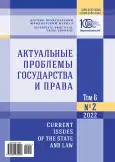Problems of implementation of the state protective function in the field of human rights protection in the digital space
- Authors: KOLOSOVA T.E.1
-
Affiliations:
- Vladimir Branch of the Russian Presidential Academy of National Economy and Public Administration
- Issue: Vol 6, No 2 (2022)
- Pages: 151-157
- Section: General Theory and History of Law and the State
- URL: https://journal-vniispk.ru/2587-9340/article/view/303756
- ID: 303756
Cite item
Abstract
Digitalization of all spheres of life of society and the state has actualized the problems that arise when the state implements its protective function in the field of human rights protection in conditions. The special significance of these issues is due to the consolidation in the Constitution of the Russian Federation of ensuring the security of the individual, society and the state in the application of information technologies, the circulation of digital data as an independent subject of the Russian Federation in the field of defense and security. The purpose of this study was to substantiate the hypothesis of the need for the state to take systemic measures aimed at ensuring the digital security of the individual, society and the state. The methodological basis of the study was the dialectical method of cognition of the considered socio-legal phenomena. In addition, when writing the article, the following methods were used: the logical method used in determining the sequence of presentation of the material and the formulation of conclusions, the method of system analysis, the method of modeling, the structural and functional method, as well as the method of referring to the conclusions of the theory of human rights. The paper analyzes the main directions of the implementation of the protective function of the state in this area, to which the author refers: ensuring the safety of personal data of citizens obtained as a result of information exchange, and the exclusion of their use for illegal purposes; compliance with labor and other social rights of citizens in the conditions of their involvement in new digital forms of economic activity, in particular, when interaction with digital platforms; gradual and reasonable introduction of digital document management while preserving its traditional forms; ensuring the digital sovereignty of the state and taking measures to prevent the use of the digital information space for discrimination against Russian citizens, disinformation and destructive activities. The author substantiates the need for specific measures that the state can and should take as part of the implementation of its protective function to neutralize and reduce risks in the field of ensuring and protecting human rights in the digital space. The results of the conducted research can be applied in standard-setting and law enforcement activities in the field of implementation of the state policy on ensuring digital security, as well as in further scientific research in this area of law.
About the authors
Tatiana E. KOLOSOVA
Vladimir Branch of the Russian Presidential Academy of National Economy and Public Administration
Author for correspondence.
Email: at1892@yandex.ru
ORCID iD: 0000-0001-7774-2991
SPIN-code: 8793-7341
Senior Lecturer of the Civil Law Disciplines Department
Russian Federation, 59a Gor’kogo St., Vladimir 600017, Russian FederationReferences
- Arkhipov V.V., Naumov V.B. Skvoznyye pravovyye problemy Interneta veshchey i predely prava: rossiy-skaya perspektiva [Cross-cutting Legal Problems of the Internet of Things and the Limits of Law: Russian Perspective]. Trudy Instituta gosudarstva i prava RAN [Works of the Institute of State and Law of the Russian Academy of Sciences], 2018, vol. 13, no. 6, pp. 94-123. (In Russian).
- Grudtsyna L.Y. Tsifrovoye budushcheye prava: k voprosu ob additivnykh tekhnologiyakh [Digital future of law: to a question on additive technologies]. Zhurnal rossiyskogo prava – Journal of Russian Law, 2021, no. 7, pp. 5-14. (In Russian).
- Lebedeva Y.N. Novoye v razgranichenii voprosov vedeniya Rossii [New in differentiation of questions of com-petence of Russia]. Gosudarstvennaya vlast’ i mestnoye samoupravleniye [State Power and Local Self-Government], 2021, no. 9, pp. 20-21. (In Russian).
- Khabriyeva T.Y., Klishas A.A. Tematicheskiy kommentariy k Zakonu Rossiyskoy Federatsii o popravke k Kons-titutsii Rossiyskoy Federatsii ot 14 marta 2020 g. № 1-FKZ «O sovershenstvovanii regulirovaniya otdel’nykh voprosov organizatsii i funktsionirovaniya publichnoy vlasti» [Thematic Comment to the Russian Federation Law on Amendment of the Constitution of the Russian Federation on March 14, 2020, № 1-FKZ “On Improve-ment of Regulation of Individual Issues of Organization and Functioning of Public Authorities”]. Moscow, Norma Publ., INFRA-M Publ., 2020, 240 p. (In Russian).
- Pozharskiy D.V. Okhranitel’naya funktsiya gosudarstva: teoretiko-metodologicheskiye problemy: dis. ... d-ra yurid. nauk [Protective Function of the State: Theoretical and Methodological Problems. Dr. law sci. diss. abstr.]. Moscow, 2014, 418 p. (In Russian).
- Varlamova N.V. Tsifrovyye – novoye pokoleniye prav cheloveka? [Digital – a new generation of human rights?]. Trudy Instituta gosudarstva i prava RAN [Works of the Institute of State and Law of the Russian Academy of Sciences], 2019, vol. 14, no. 4, pp. 9-46. (In Russian).
Supplementary files








